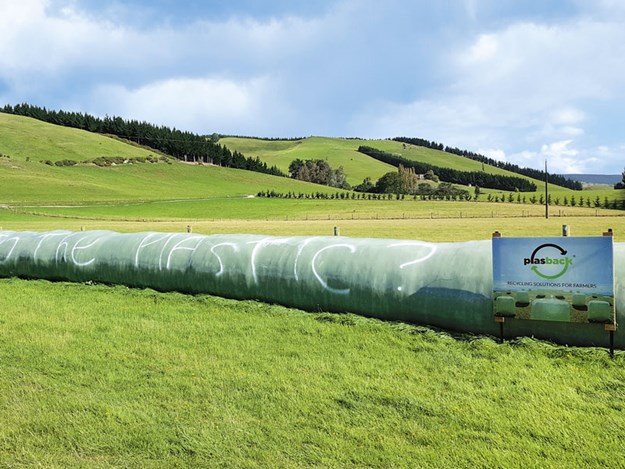Plasback supports greater scrutiny of ag plastic recycling
72% of Kiwis are worried about the build-up of plastic in the environment. Plasback says the agricultural industry must show it’s doing its bit to address it.
Remember that endless supply of plastic bags you used to get when you bought your groceries? Remember how quickly they disappeared once consumer expectations swung against them? This should be a sobering reminder to farmers and plastic wrap suppliers, says the head of Plasback, New Zealand’s on-farm recycling scheme.
 |
|
Public concern about the environmental impact of plastic waste is growing, and Plasback says the agricultural industry must show it’s doing its bit to address it
|
Plasback manager Chris Hartshorne says the government has responded to public opinion and is exploring regulation of farm plastics. "Now that Associate Minister for the Environment Eugenie Sage has announced a consultation on a Mandatory Product Stewardship scheme for farm plastics, the time has come for all plastic suppliers to the primary sector to consider their responsibilities."
Chris says a December 2018 Colmar Brunton Better Futures report found that plastic waste in the environment topped the list of social and environmental issues that most concern New Zealanders.
"The poll shows that 72% of Kiwis are worried about the build-up of plastic in the environment," he says. "This is very significant when you consider that plastic waste was more concerning than such major issues as the cost of living and the protection of our children, which were in second and third place in the poll.
"The agricultural industry must take note because the public’s attitude towards single-use plastics is yet another issue that can affect our reputation among consumers."
Chris wants to see all New Zealand plastic wrap distributors get behind the Plasback scheme. He says they should do voluntarily because government-imposed requirements would likely be more costly.
"The Plasback recycling scheme was set up 14 years ago, and we now have an efficient nationwide network of collectors and depots to collect waste silage wrap and silage sheeting. "The volumes we collect have grown considerably since we began. In our 2018–2019 year, we collected 2400 tonnes of plastic, but we have collected 1100 tonnes in the first two months of the current year.
"More and more rural businesses recognise they need to tackle the issue of plastic waste. Plasback primarily collects silage wrap and silage covers but we’re getting requests from suppliers of other products such as fertiliser and feed bags and plastic irrigation pipe to collect their used products."
Plasback currently collects all brands of silage wrap. Chris says some companies are getting a free ride because they distribute plastic products to New Zealand farmers but do not contribute to an accredited Product Stewardship scheme.
.jpg) |
|
Plasback has a nationwide network of contractors who collect used silage wrap from farms and process it using industrial balers
|
"This needs to change. The Ministry has signalled it’s changing its thinking towards mandatory product stewardship to stop free riders. Public attitudes are shifting and everyone in the agricultural plastics industry really has to get serious about their ethical responsibility to manage the environmental impact of the products they sell.
"Farmers are putting pressure on their contractors and asking what they are doing to help recycle the plastics they are putting on farm."Chris sites the case of the Spanish manufacturer Aspla, one of Europe’s leading manufacturers of silage film. Aspla products are distributed in New Zealand by Donaghys Crop Packaging.
In accordance with its sustainable development policy, Aspla has joined Plasback.
"Every manufacturer and distributor has an obligation to contribute and they should get credit from contractors, farmers, government and the public for doing so," Chris says.
Going forward, there’s a drive for all producers who put packaging plastics into the market to take more responsibility for the disposal of their products. Chris believes the Plasback scheme and the farm chemical container recycling programme Agrecovery have demonstrated that there is a need for these product stewardship schemes and farmers are willing to use them.
With a product stewardship programme in place, farm plastic could be part of circular supply chain in which it’s recycled and turned into products that are used in agriculture or other industries such as Tuffboard and builders’ film.
Keep up to date in the industry by signing up to Farm Trader's free newsletter or liking us on Facebook


.jpg)

.jpg)











